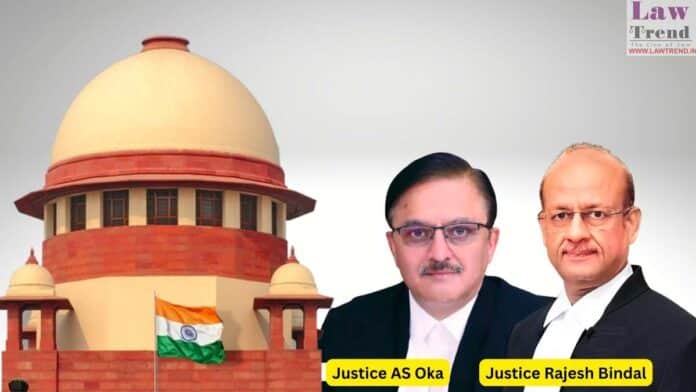The Supreme Court on Wednesday refused to stay the Rajasthan High Court order acquitting four men who were handed down death penalty by the trial court in the 2008 Jaipur serial blast case, saying it cannot pass an order for such “drastic action” mechanically without hearing those held not guilty.
Jaipur was rocked by a series of blasts on May 13, 2008 when bombs went off one after another at Manak Chawk Khanda, Chandpole Gate, Badi Chaupad, Chhoti Chaupad, Tripolia Gate, Johri Bazar and Sanganeri Gate. The explosions left 71 people dead and 185 injured.
A bench of Justices Abhay S Oka and Rajesh Bindal, however, stayed a direction passed in the March 29 judgement of the high court asking the state’s Director General of Police to order inquiry against the investigating officer and other police personnel involved in the case.

The bench, which refused to stay the high court verdict, imposed certain conditions and directed that the four people, who were acquitted, be released unless wanted in any other case.
Attorney General R Venkataramani, appearing for the Rajasthan government along with senior advocate Manish Singhvi, urged the bench to stay the high court verdict, saying those acquitted were convicted and awarded death penalty for a serious crime.
Senior advocate Maninder Singh and advocate Aditya Jain, appearing for the family members of the victims, also sought a stay of the high court verdict.
The bench said it is not going to “mechanically stay” the high court’s order and needed to hear those acquitted.
It directed all the four will surrender their passports and, if released from jail, they will register their appearance on a daily basis between 10 am and 12 noon before the Anti-Terror Squad police station in Jaipur.
The bench, after being informed that two of them have been served notice on the petitions against their acquittal, directed the Rajasthan government to ensure that notices are served to the two others– Saif and Saifurrehman.
The top court was hearing appeals filed by the state government and family members of the blast victims challenging the high court verdict.
Venkataramani submitted the bench may issue an order for continued detention of the four persons acquitted under section 390 of CrPC.
“We are not inclined to pass the order for keeping them in jail even after their acquittal. We are aware that there is power under section 390 of CrPC. Even assuming that you (AG) are right, before passing such a drastic order, we have to go through the entire evidence. We have to hear all of them (those acquitted). We will have to apply our mind in the case,” the bench said.
The bench said an order for such a “drastic action”, without hearing all who were acquitted by the high court and without perusing the entire record, cannot be passed.
“The presumption of innocence gets reinforced after acquittal. In our view, before we examine the drastic prayer made by the Attorney General, we will have to examine the evidence and other material on record before the high court. We will have to hear all the persons, who were acquitted by the high court,” the bench said.
It directed production of entire trial court case records, which were placed before the high court, and asked the state government to ensure the documents are placed before it within eight weeks.
The bench, which posted the matter for further hearing on August 9, said if the matter is not taken on the said date, then the state government is at liberty to argue on the point of section 390 of CrPC (arrest of accused in appeal against acquittal).
It also clarified that those acquitted cannot refer the high court judgement in any other case for securing bail.
It directed that the matter to be placed before Chief Justice of India, saying it needs to be heard by a bench of three judges, as this is an appeal against death reference.
The Rajasthan government had on April 25 filed an appeal challenging the high court verdict in the case.
The top court had on May 12 permitted family members of the victims to file an appeal against the verdict and listed the petition along with that of the state government for hearing.
The Rajasthan High Court had on March 29 set aside the lower court verdict awarding death penalty to the four accused in the case and slammed the probe agencies for “shoddy investigation”.
The high court had also affirmed the acquittal of a fifth accused by the trial court.
It had pulled up the investigating agencies for doing a shoddy investigation in connecting the chain of evidence and also directed Rajasthan’s police chief to take action against the officers involved in the probe.
Also Read
The court had said it may be true that if accused(s) in a heinous crime go unpunished or are acquitted, a kind of agony and frustration may be caused to the society in general and to the family of the victims in particular. However, law does not permit courts to punish the accused on the basis of moral conviction or on suspicion alone.
In December 2019, a special court had awarded death sentence to four men –Mohammad Saif, Mohammad Salman, Saifurrehman and Mohammad Sarvar Azmi — and acquitted Shahbaz Hussain.
While the state government challenged the acquittal of Shahbaz Hussain in the high court, the four awarded capital punishment filed an appeal against the trial court order.







